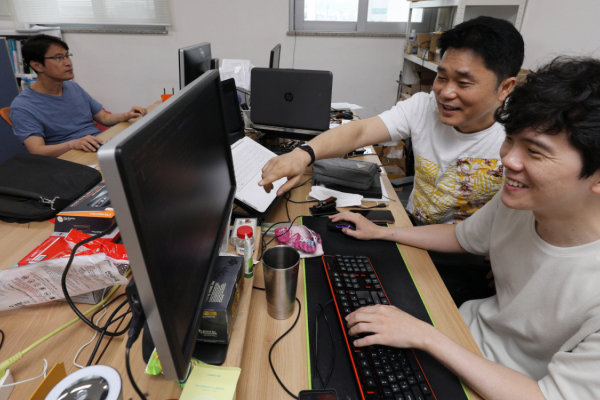IT solution meets shuttles and fixed route buses. Innovatively improves convenience and economic feasibility “Aims at 10 billion won revenue by end of year. Determined to make Demand-Response Bus service in rural villages a success”
Established in 2012, CIEL, Inc. is the leading smart mobility company bringing innovation to the bus service industry. They provide everything from integrated management IoT solutions for shuttle buses to on-order shared bus mobility service, and is currently the leader in the domestic industry.
It all started when CEO Muyoul Park launched the ‘HelloBUS’ service in 2012 after taking notice of the inconvenience of existing company commuter buses.
CEO Park says, “shuttle buses were inconvenient in that you couldn’t board if you missed its schedule, the shuttle stops were distanced inconsistently, and the routes were frequently altered. Using IoT technology we realized location monitoring, route planning and bus allocation, and passenger management functions.”
This service has optimized existing shuttle bus management and innovatively improved user convenience. HelloBUS users can easily check the exact location of company commuter bus on their smartphones, and can even receive messages when the shuttle is nearing the pickup zone.
They have signed contracts with multiple big companies for installation and operation of an integrated management system for commuter buses. Operational efficiency has vastly improved by the availability of systemized management of inefficient routes where seats were empty or passengers had to stand due to lack of passenger management. Starting in 2017, the shared work and school commuter bus system, SHUTTLECOK, launched its service. It is a shared work and school commuter bus transit service that can be shared by passengers who are going to the same location or heading in proximate routes.
With the additional popularity of SHUTTLECOK, CIEL is currently reaffirming its position as the domestic leader in its performance of providing company commuter solutions. Since 2012, they have been providing integrated management service for shuttle buses to 250 companies and organizations, with 3,590 registered vehicles, 8,462 routes, serving 300,000 passengers.
CEO Park said, “implementing such a service was not as easy as it sounds. This is because we need the ability search routes, automated allocation to meet transit demand and to minimize travel time with empty vehicles, pre- and real-time reservations, mobile payments and passenger authentication, driver cost payment, real-time location control, driving history and statistics writing systems.”
However, the experience accumulated after trial and error left him with a huge asset. “As of March last year, 6.7 billion cases of vehicle operation, passenger entry and exit, route operation, and dispatch history data were accumulated,” CEO Park said. “This is why our company has lead the development of related technologies such as optimal route analysis, design, road traffic forecast, and transit demand projection.”
Some industry fields have been taking advantage of such capabilities and have been challenging themselves since last year. MOD (Mobility on Demand) services, which improves users’ mobility and accessibility by creating real-time routes and autonomous driving routes is one of them. MOD bus operates by optimizing stops, drop-offs, and routes according to flexible demands by passengers within the range of operation. In particular, if the service is provided in areas lacking in public transit such as industrial complexes, farming and fishing villages, and new cities, there are high expectations for it to supplement and replace the shortcomings of existing public transportation.
Since the end of last year, the Ministry of Land, Infrastructure and Transportation has been conducting an ‘I-MOD’ demonstration project that introduces MOD in Incheon’s Yeongjong International City as one of the smart city projects. The waiting time for publics buses were 78 minutes in Yeongjong-do, but the service reduced it to about 10 minutes. Since June, Gunwi-gun has also started the demonstration project with rural-type MOD buses. The plan includes introducing on-demand bus to enhance convenience of transit use by the handicapped and to improve operational efficiency in the outskirts of the county and streamlining public transportation system by operating circular routes in the central area.

©Maeil Newspaper
CEO Park said, “buses in farming and fishing villages travel empty more than 70 percent of the time. However, since the area will become isolated if there were no buses the area, a more efficient service should be devised. Successful results from Gunwi-gun will make it more likely that the project will expand to other local governments and overseas.” As the service sector grows, the size of the company is growing rapidly. CIEL currently has 15 solution development management and operations staff, and its number of employees has grown to well over 30 when also combined with its subsidiary vehicle operators.
CEO Park announced that “sales increased from 3.2 billion won in 2018 and 4.6 billion won last year to 10 billion won this year. We hired five additional employees last year alone, and we plan to hire about 10 more this year.”
CEO Park showed his willingness to show a transformed appearance of a declining passenger transportation service industry by bringing on technology. He said that “all industries will be consumer-oriented in the future, just as manufacturing is producing a large variety of products in small quantities” and that he “believes that our company, which has an understanding of both the transit services and information and communication technology, can transform the passenger transportation industry with on-demand bus mobility.”
©Maeil Newspaper





